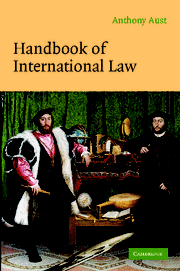Book contents
- Frontmatter
- Contents
- Foreword
- Preface
- Acknowledgments
- Table of treaties
- Table of MOUs
- Table of cases
- Glossary of legal terms
- List of abbreviations
- 1 International law
- 2 States and recognition
- 3 Territory
- 4 Jurisdiction
- 5 The law of treaties
- 6 Diplomatic privileges and immunities
- 7 State immunity
- 8 Nationality, aliens and refugees
- 9 International organisations
- 10 The United Nations, including the use of force
- 11 Human rights
- 12 The law of armed conflict (international humanitarian law)
- 13 International criminal law
- 14 Terrorism
- 15 The law of the sea
- 16 International environmental law
- 17 International civil aviation
- 18 Special regimes
- 19 International economic law
- 20 Succession of states
- 21 State responsibility
- 22 Settlement of disputes
- 23 The European Union
- Index
20 - Succession of states
Published online by Cambridge University Press: 05 August 2012
- Frontmatter
- Contents
- Foreword
- Preface
- Acknowledgments
- Table of treaties
- Table of MOUs
- Table of cases
- Glossary of legal terms
- List of abbreviations
- 1 International law
- 2 States and recognition
- 3 Territory
- 4 Jurisdiction
- 5 The law of treaties
- 6 Diplomatic privileges and immunities
- 7 State immunity
- 8 Nationality, aliens and refugees
- 9 International organisations
- 10 The United Nations, including the use of force
- 11 Human rights
- 12 The law of armed conflict (international humanitarian law)
- 13 International criminal law
- 14 Terrorism
- 15 The law of the sea
- 16 International environmental law
- 17 International civil aviation
- 18 Special regimes
- 19 International economic law
- 20 Succession of states
- 21 State responsibility
- 22 Settlement of disputes
- 23 The European Union
- Index
Summary
Kingdoms are clay.
Shaw, International Law, 5th edn, Cambridge, 2003, pp. 861–913
Brownlie, Principles of Public International Law, 6th edn, Oxford, 2003, pp. 621–43
Oppenheim. Oppenheim's International Law, 9th edn, London, 1992, pp. 204–44
Aust, Modern Treaty Law and Practice, Cambridge, 2000, pp. 305–51
A state may change its name, constitution or government by revolution or constitutionally, but it will retain its international legal personality and remain bound by its international obligations. If some of its territory becomes a new state it has to be determined which rights and obligations of the (predecessor) state become those of the new (successor) state. Succession to treaties, to state property, archives and debts, and to membership of international organisations, are the main topics discussed below. The value of state practice before the Second World War as a guide to today's problems of succession is questionable. The post-war era of decolonisation and the end of the Cold War led to the total number of states increasing nearly fourfold and has given us a useful body of modern state practice.
The law is complex, and is especially dependent on the particular circumstances of each case. The two Vienna Conventions on succession (see below) are of some help, but must be approached with caution. One has entered into force, but has very few parties; the other is not in force and is unlikely ever to be so. Neither applies to a succession that occurs before their entry into force.
- Type
- Chapter
- Information
- Handbook of International Law , pp. 390 - 406Publisher: Cambridge University PressPrint publication year: 2005



